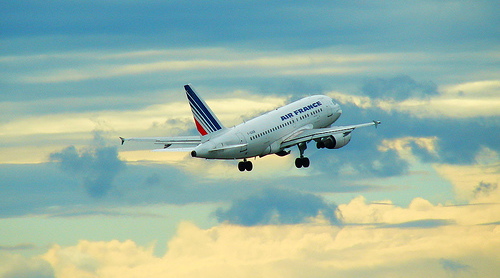Thu, 05/27/2010 - 10:17
Hope for frequent flyers? Air France and American Airlines test their first "green" trans-Atlantic flight
Photo posted by Amadeus Kanaan on Flickr
Eco-conscious globe-trotters are painfully aware that no matter how much effort they put into reducing their carbon footprint on a daily basis, it will be blown to smithereens the minute they set foot on an airplane. According to the DGAC, a French aviation expert body, one round trip Paris-New York flight (12 000 km) emits more than 1 tonne of CO2 per passenger.
So when I heard of the first ever trial “green” trans-Atlantic flights, jointly operated by Air France and American Airlines in April, I felt a surge of hope. Have airline companies found a solution to significantly slash their plane’s CO2 emissions?
Not yet, it turns out. Air France said its trial flight saved two to three tonnes of jet fuel and cut CO2 emissions by six to nine tonnes. That’s less than 10% of the average emissions produced by a normal Paris-Miami flight.
Still, the experiment, conducted under the US-EU Atlantic Interoperability Initiative to Reduce Emissions (AIRE), shows how the application of simple operational procedures and new technologiescan have a direct impact on reducing carbon emission and noise pollution, as well as conserving fuel. According to Air France, if the optimal procedures were conducted on all its long-haul flights to North America, the company would save 43, 000 tonnes of fuel per year and cut CO2 emissions by 135, 000 tonnes.
Carbon offsetting vs. Carbon reduction
Even when these procedures become the norm, air travel will remain the most polluting means of transportation. Since it’s also the fastest – and often the only available – way to cover long distances, eco-conscious travellers are faced with a tough dilemma.
For a while, carbon offsetting (compensating for the carbon emitted by your flight by making a donation to an environmental organization) seemed like a good way to fly responsibly. But recently, the travel professionals most serious about environmental preservation – such as Britain’s leading green travel site Responsibletravel.com – have shied away from carbon offsetting, which they say “distracts” travellers from their core objective of reducing their carbon emissions.
Although it certainly can’t hurt to make a donation to, say, a rainforest conservation group or tree-planting initiative working to pump oxygen into our atmosphere, travellers who want to reduce the environmental impact of their journey also need to keep several other choices in mind:
Opt for train travel whenever possible, even if it means choosing a vacation spot closer to home. Not only are trains far less polluting than airplanes, but they are also often cheaper, more central, and avoid travellers the wait and hassle of airport paperwork and security. Trains are a more obvious choice when covering shorter distances, but night sleeper trains can also be a green, if somewhat old-fashioned, alternative to medium-haul flights.
If you must fly, choose a direct flight when you can, which minimizes the number of take-offs and landings (the most fuel-hungry flight-phases) in your trip. In a tiny but significant gesture, you can save paper by not printing out your electronic ticket. Responsibletravel.com recommends using air travel only for longer breaks, and on location making housing and leisure activity choices that are respectful of local communities and the environment.
On another note, I can’t resist ending this post with a brief mention of a gloriously retro-futuristic project I read about a while ago: a solar-powered dirigible reminiscent of the blimps (or zeppelins) that populated the sky in the 1930s. Sadly, the company involved, Turtle Airships, has neither the funding nor the expertise necessary to develop their project – but it can’t hurt to dream, can it?
Tags for all blogs :
Comments or opinions expressed on this blog are those of the individual contributors only, and do not necessarily represent the views of FRANCE 24. The content on this blog is provided on an "as-is" basis. FRANCE 24 is not liable for any damages whatsoever arising out of the content or use of this blog.




1 Comments
Post new comment